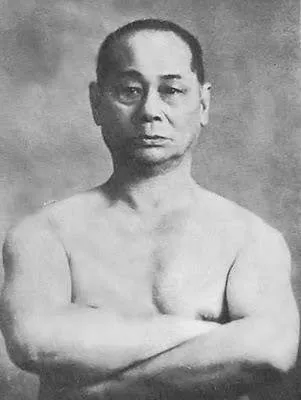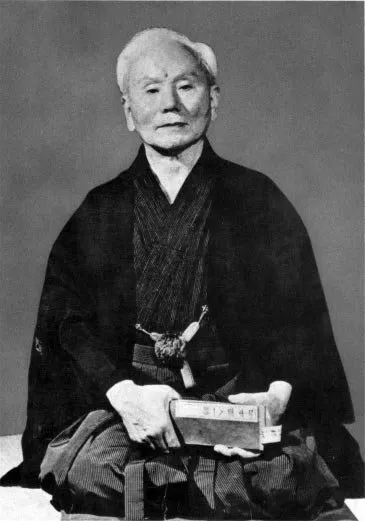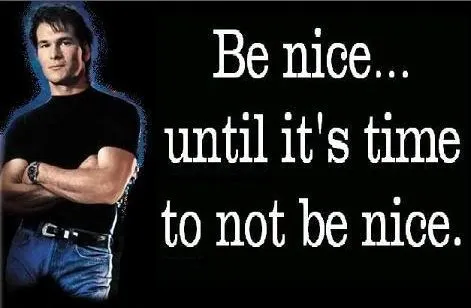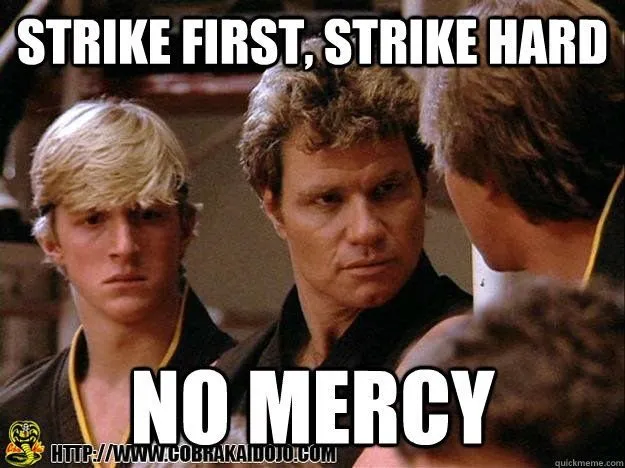Anyone who’s studied traditional Karate knows the Golden Rule, “Karate Ni Sente Nashi”, loosely defined as, “There is no first attack in karate.” The golden precept was popularized by the father of modern karate, Gichin Funakoshi, who founded the system of Shotokan Karate.
Gichin Funakoshi popularized the “defensive” aspect of karate that we know today. An article written in 1922 in Tokyo quoted Funakoshi Sensei as saying: “Essentially, the principle purpose of karate is defense. The initial move has long been strictly prohibited, and it is said there is no initial move in karate. This martial art is to cultivate a modest mind, which must not be uselessly carried away by the martial spirit. Moreover, it requires no weapon. So, I think it is most suitable as a civilized self-defense art.”
Funakoshi Sensei’s quote makes clear how he felt about karate’s place in society. It was too him, strictly a character developing tool, and a method of building the model Japanese citizen. The implications for this were huge, because his philosophy laid the foundation for the modern sport of karate over the next 100 years.
Believe it or not, this idea of a purely defensive art was not shared by every Okinawan karate master. Choki Motobu was the most famous karate master of his time, more famous than Gichin Funakoshi. And he and Funakoshi did not like each other. Funakoshi and Motobu were like fire and water. Where Funakoshi was educated and studious, Motobu was rough brawler, and pragmatic. The idea of “Karate Ni Sente Nashi” did not sit well with Motobu, and he countered it with his own rule, “Karate is Sente.” Which implies that Karate is about making the first move.

To better understand the nuances in the two masters wordplay, one must understand the basic strategies of conflict in traditional karate. The first is referred to as “Sen” which means to seize the initiative. It means to attack when you see an opening. The second strategy is “Sen No Sen,” which means, waiting for the first attack and countering it. This is the block and hit strategy every white belt learns. The third strategy is “Go No Sen”, which means “countering the opponent’s initiative before it actually happens.”
This third strategy has the potential to cause confusion. Some people think it literally means having a sixth sense. They believe that years of karate training will give one the ability to read the attackers mind or sense their lethal intent with your chi.
Watch this 5th degree Ninjutsu black belt test for a laugh to understand what I mean. The students have to sense their masters intent to wack them in the head, and roll out of the way before he does it.
I don’t believe there’s anything mystical about “Go No Sen.” I believe it is the highest form of self-defense, but it isn’t magic. From this perspective, “Karate Ni Sente Nashi,” and “Karate is Sente” are both correct. To understand what I mean, you have to broaden your definition of conflict. Conflicts begin long before the first blow is thrown. For example, you can become sensitive enough identify pre-attack indicators. These are behaviors violent people often display before they attack.
Years ago, I lived in Albuquerque New Mexico and moonlighted as a bouncer at a popular bar. I developed an ability to predict fights before they occurred. This is nothing special since every bouncer develops the ability rather quickly. When you see the same thing night after night you get familiar with it fast.
When you sense that you’re going to be attacked you have space to decide. Your decision can be to take a step back so you’re out of the line of fire, run away, or hit first. If you hit the opponent first, are you not violating the Golden Rule? Not exactly, in my opinion. Funakoshi taught a very orthodox version of “Karate Ni Sente Nashi.” To him, it literally meant you can’t punch somebody unless they punch you first. This might have reflected Imperial Japan’s political climate as much as his own personal belief. If you look at it like Motobu would have, the saying is about evil intent. You should never go around intending to harm people, but if someone intends to harm you, you must do whatever it takes to defend yourself. If the situation calls for a pre-emptive strike, then that is what you must do. I do not morally object to this kind of strategy. You only start crossing an ethical line when you start hitting everyone who you think might have ill thoughts about you.
A karate practitioner must enter every conflict with an empty mind. Only in this state will they take appropriate action.




